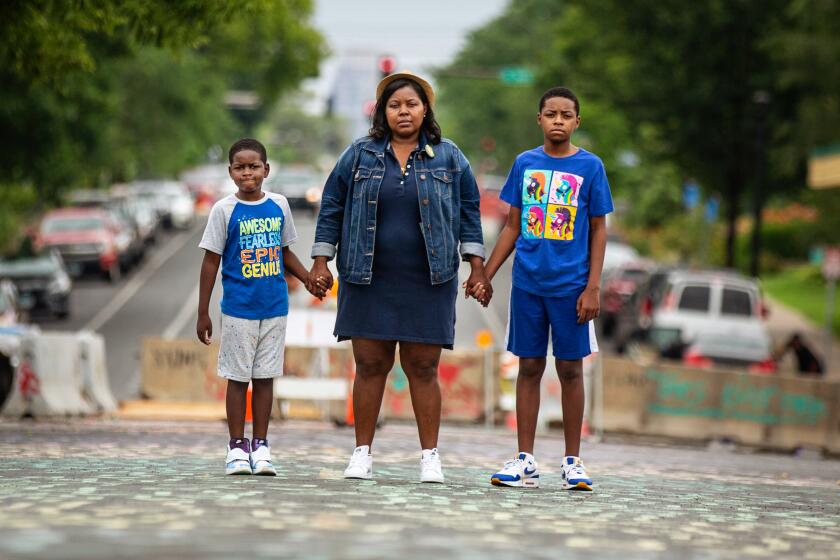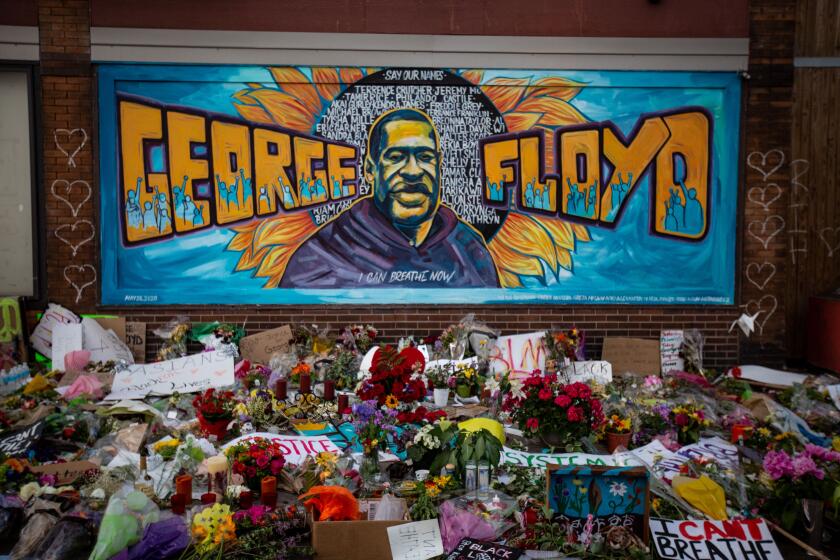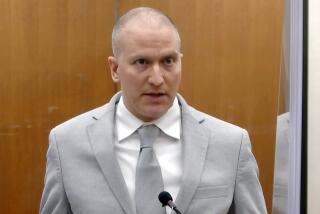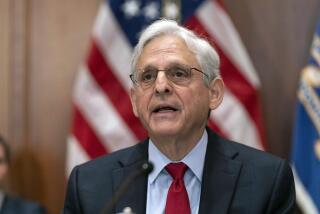Lead cop in George Floyd case had record of overusing restraints, prosecutors reveal
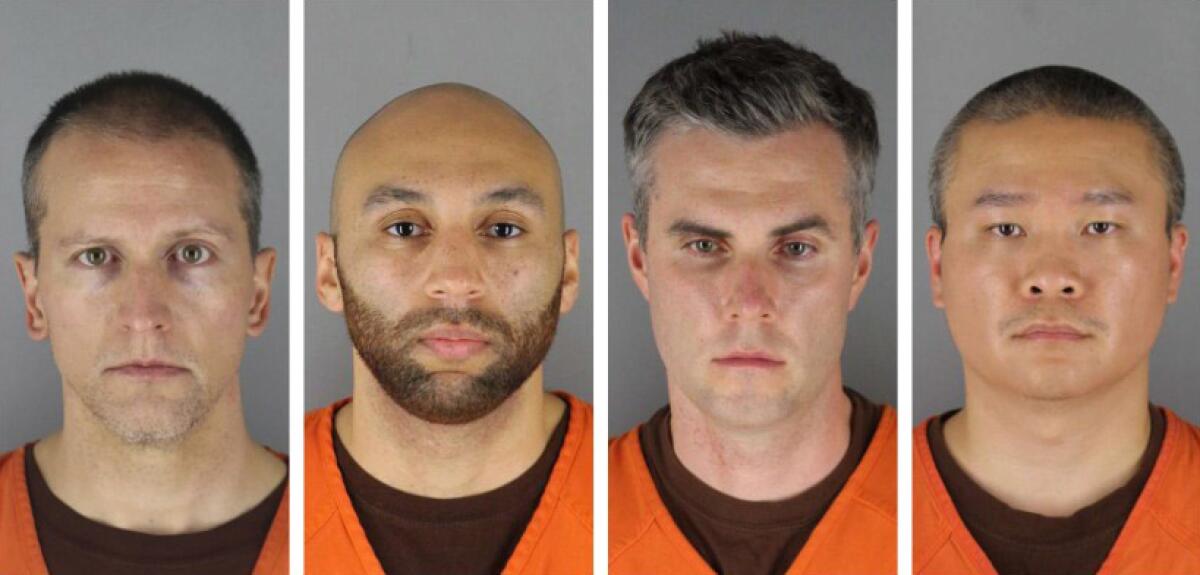
MINNEAPOLIS â A white police officer accused in the death of George Floyd had used neck or head and upper-body restraints seven times before, including four incidents in which prosecutors say he went too far, according to documents released Friday in the case against four former Minneapolis officers charged in Floydâs death.
In a July 2019 arrest, prosecutors say, Derek Chauvin kicked an intoxicated man in the midsection, then applied a neck restraint until he fell unconscious. In June 2017, Chauvin restrained a woman by placing his knee on her neck while she was prone, prosecutors said. Prosecutors said in those cases and in two others he held the restraints âbeyond the point when such force was needed.â
The list of Chauvinâs arrests involving restraints was made public on the same day that he and three other former officers appeared in court for a hearing on the prosecutionâs request for a joint trial, a defense request to move the trial, and other issues. Judge Peter Cahill took most issues under advisement.
Floyd, a Black man, died May 25 after Chauvin pressed his knee against Floydâs neck even as Floyd, who was in handcuffs, said he couldnât breathe. Floydâs death was captured in widely seen bystander video that set off protests around the world. The officers were fired. Chauvin is charged with second-degree murder and other crimes; Thomas Lane, J. Alexander Kueng and Tou Thao are charged with aiding and abetting.
Protests over the death of George Floyd subside, but the pain lingers. And the COVID-19 pandemic continues to take a disproportionate toll.
Chauvin appeared in court for the first time after attending previous hearings via videoconference from the state prison where heâs being held. He didnât make eye contact with other defendants as he arrived.
Similar documents were filed in the cases against Thao and Kueng.
During Fridayâs hearing, prosecutors told Cahill that the four former officers should face trial together because the evidence and charges against them are similar and multiple trials could traumatize witnesses and Floydâs family.
Neal Katyal, an outside special attorney for the prosecution, said multiple trials would place a heavy burden on the court and witnesses, and could delay justice for months or years. He also raised the possibility that a verdict in an initial trial could prejudice the jury pool for later trials.
A joint trial âwould allow the community to absorb the verdicts at once. We donât think they should be put through the trauma of four different jury verdicts,â he said.
But defense attorneys argued for separate trials, saying they would likely offer âantagonisticâ defenses and that evidence against one officer could hurt another.
The officers have already done plenty of finger-pointing in court filings. Attorneys for Lane and Kueng argued their clients were rookies who followed Chauvinâs lead. Thaoâs attorney, Bob Paule, said his clientâs role was âabsolutely distinctâ from the others, because he was on crowd control while the others restrained Floyd.
Chauvinâs attorney, Eric Nelson, wrote that the other men are already saying that if Chauvin committed a crime, they didnât know about it or assist in it. âThey blame Chauvin,â he wrote.
Despite momentum for police reform after the killing of George Floyd, California passed only a few reform bills amid a chaotic end of session.
Before the hearing, a few dozen protesters gathered in front of the courthouse, chanting âNo justice, no peace.â By the time the hearing ended, a large crowd had gathered. They loudly jeered defense attorneys as they left the courthouse.
But Chauvin pointed fingers, too. Nelson wrote that Lane and Kueng â the officers who responded to a forgery call â initiated contact with Floyd and that while they called for a paramedic and believed Floyd was âon something,â they didnât elevate the call to one of more urgency or give medical assistance.
Ben Crump, an attorney for Floydâs family members, told a crowd gathered outside the courthouse that defense filings highlighting Floydâs drug use amount to killing him a second time.
âThey are trying to claim some asinine theory about an overdose. I want to be clear about this. The only overdose that killed George Floyd was an overdose of excessive force and racism by the Minneapolis Police Department,â Crump said.
Cahill took the issue of a joint trial under advisement and deferred discussion on whether the trial should be moved from Minneapolis. Attorneys for all four men have said pretrial publicity has made it impossible for them to receive a fair trial in Hennepin County. Cahill said he would like to send out questionnaires to potential jurors to find out whether theyâve been affected by pretrial coverage.
Cahill granted a defense request to remove a local prosecutor from the case. Cahill said Friday that four Hennepin County prosecutors, including County Atty. Mike Freeman, are disqualified because they met with the medical examiner to discuss autopsy results.
Freeman issued a statement saying his office did nothing wrong, and that heâs confident Cahillâs order will be withdrawn or changed.
More to Read
Sign up for Essential California
The most important California stories and recommendations in your inbox every morning.
You may occasionally receive promotional content from the Los Angeles Times.
